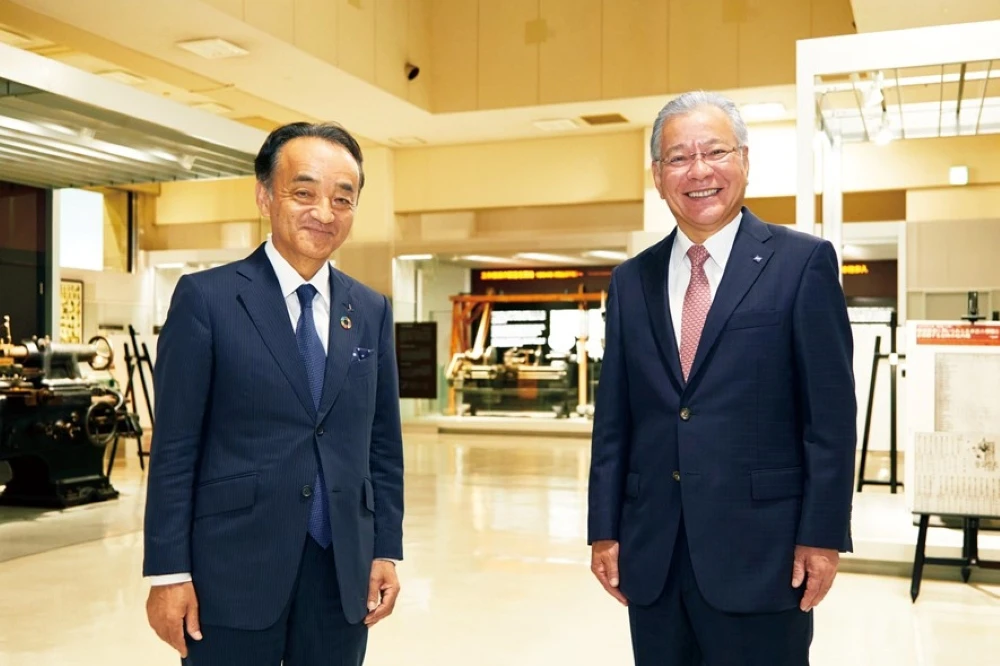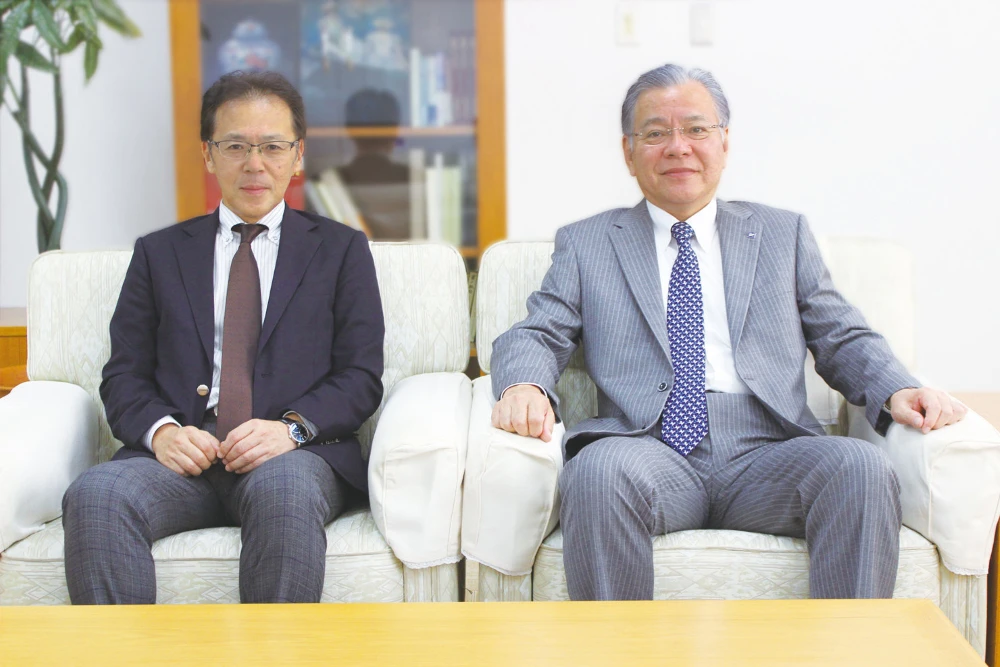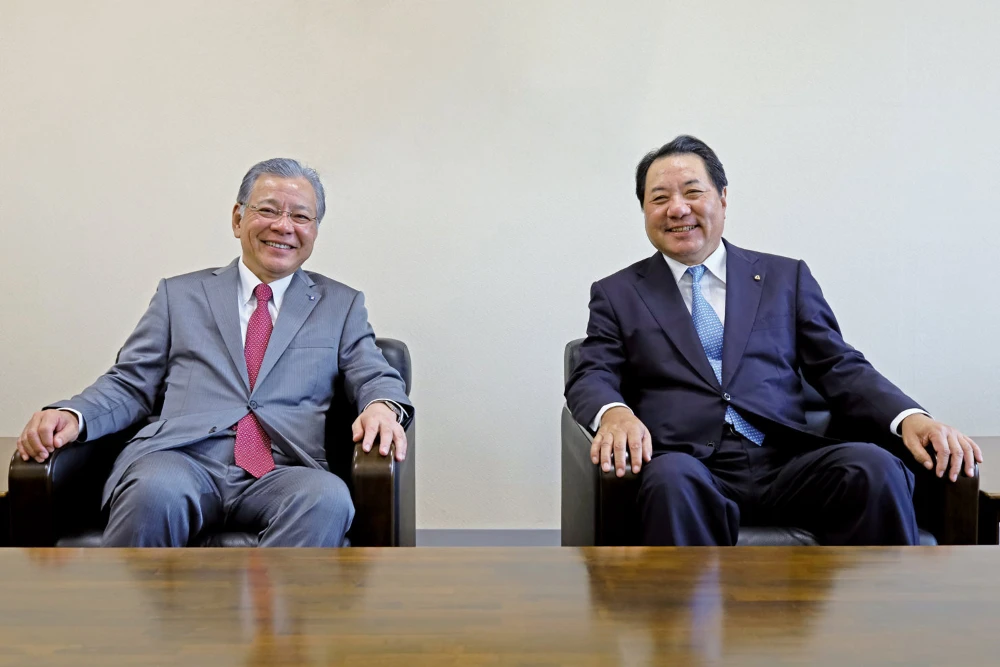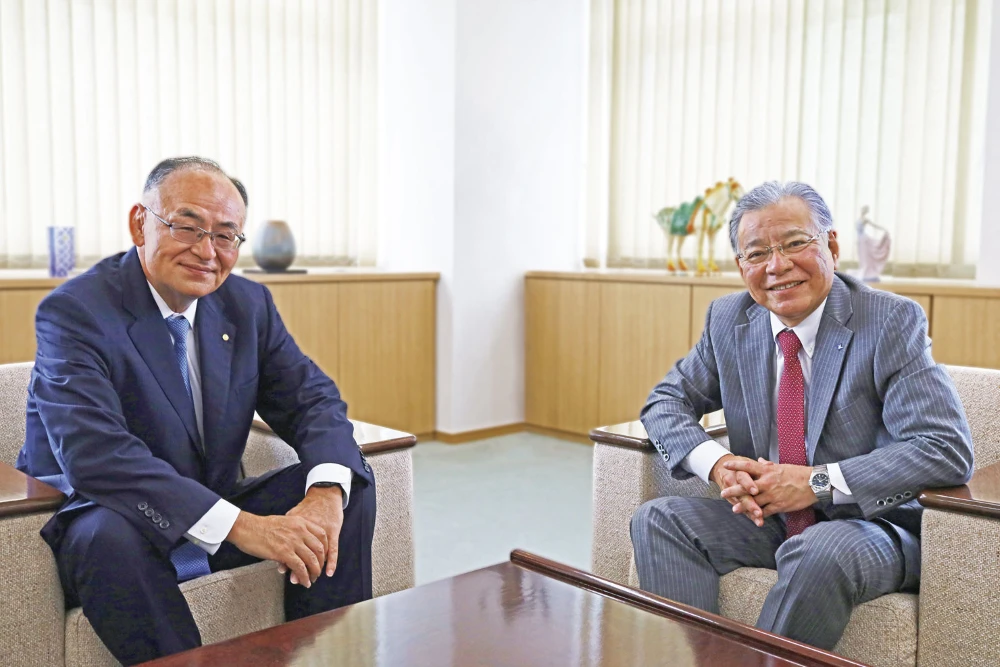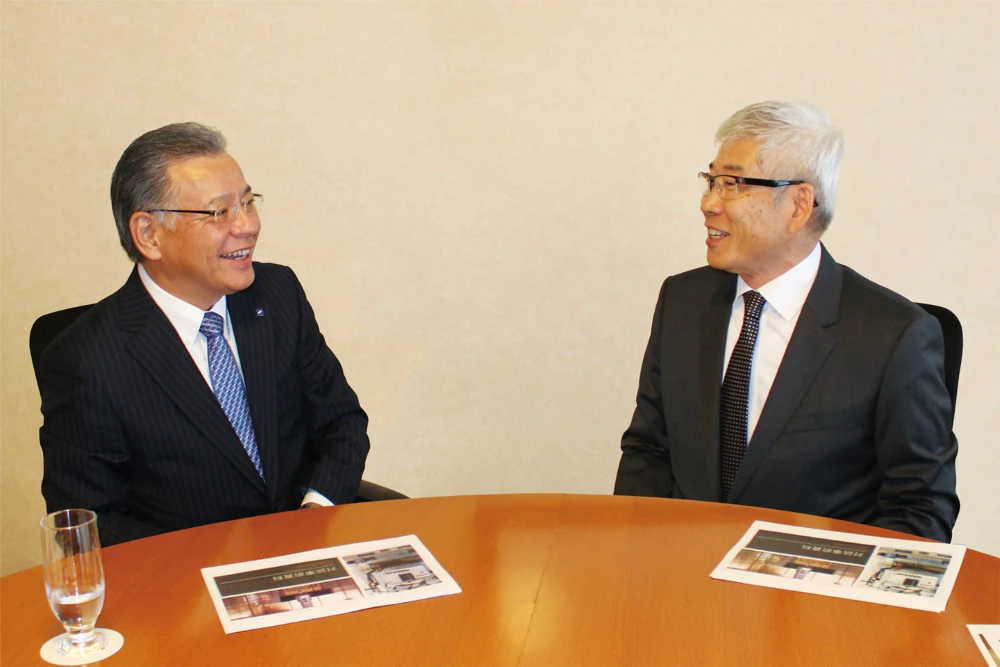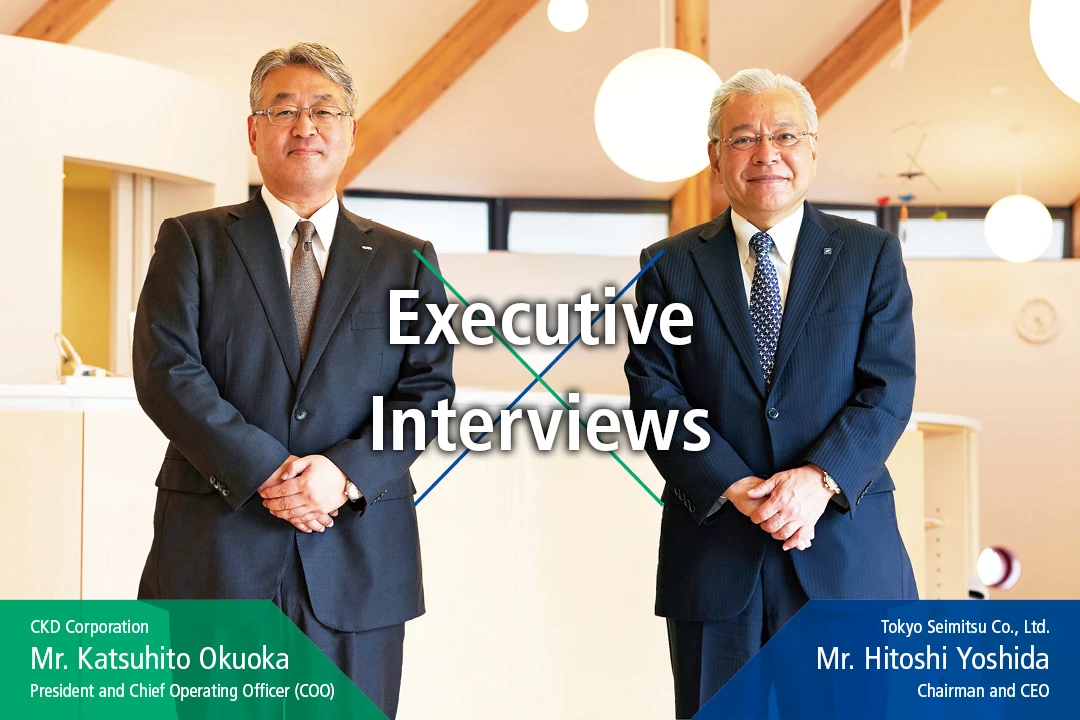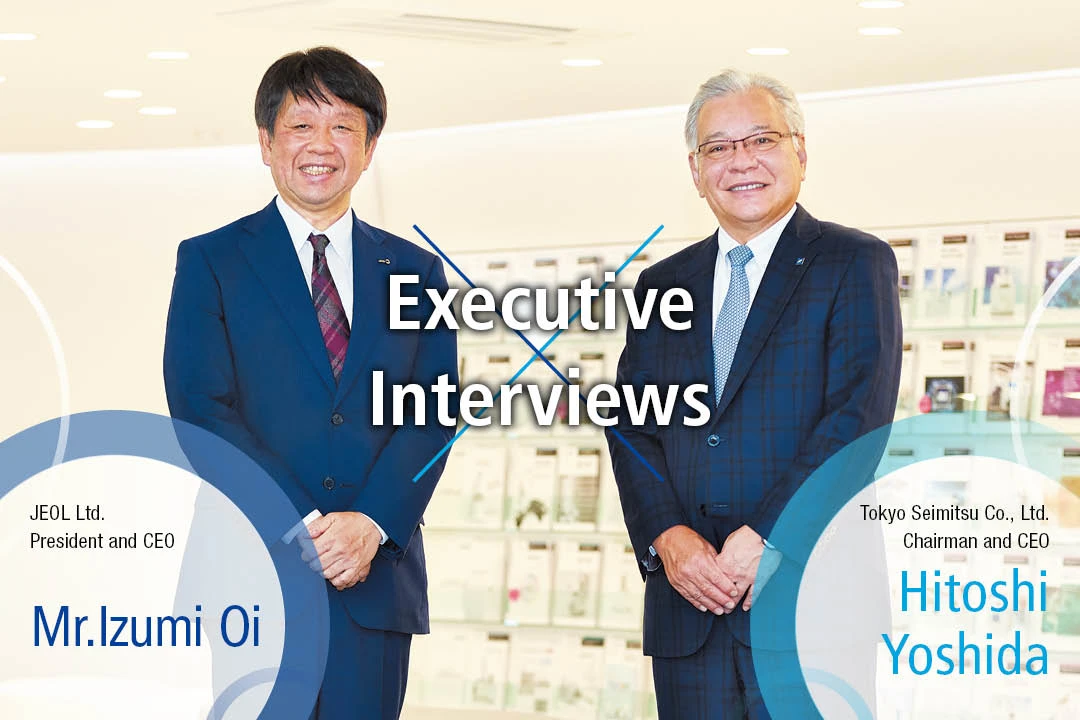
Founded as Kayaba Manufacturing Co., Ltd. in 1935, the company is a comprehensive hydraulic equipment manufacturer that provides products that make use of vibration and power control technologies that rely on hydraulic components. It is active in a wide range of fields including hydraulic components for construction machinery, shock absorbers for two- and four-wheeled vehicles, and suspension systems. It continues to provide products of uncompromising quality in Japan and all over the world, including Europe, Asia, and America.
The Men Who Have Pioneered the Future of Monozukuri Get Together Now for a Talk
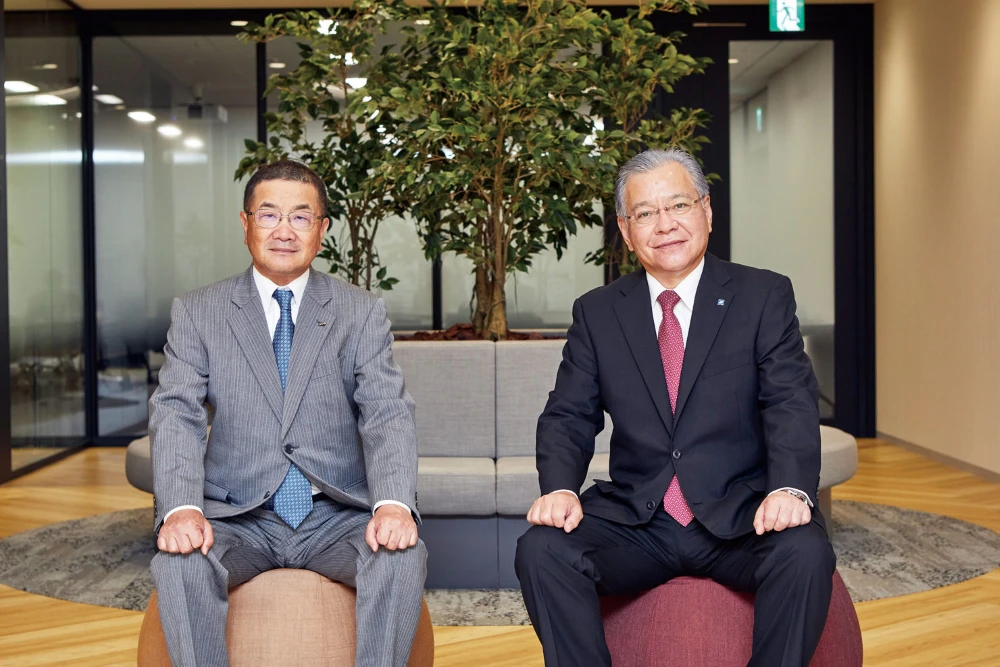
KYB Corporation
Representative Director,President Executive Officer
Masao Ôno
1979
Graduated from the School of Commerce at Meiji University
1979
Entered Kayaba Industry Co., Ltd. (current KYB Corporation)
2004
Appointed as Head of the Automotive Components Operations Planning Department
2006
Appointed as Head of the Purchasing Department
2019
Appointed as Representative Director and President Executive Officer (current position)
Tokyo Seimitsu Co., Ltd.
President and CEO
Hitoshi Yoshida
1983
Graduated from the Department of Electronics and Communication in the School of Engineering at Meiji University
1983
Entered Tokyo Seimitsu Co., Ltd.
2015
Appointed as President and CEO (current position)
2016
Awarded the ND Marketing Award
2020
Appointed as Chairman of the Japan Precision Measuring Instruments Manufacturers Association (current position)
About President Ôno
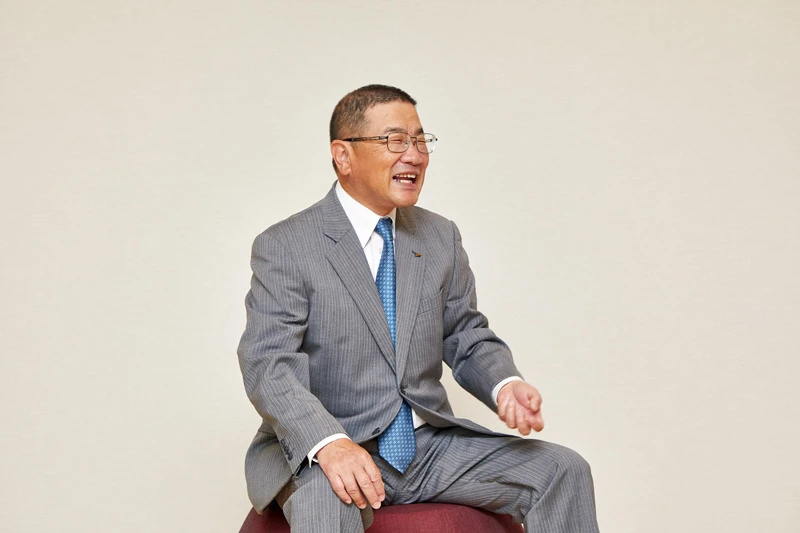
Yoshida
What kind of school life did you lead before entering KYB?
Ôno
I went to Meiji University like you, President Yoshida, and studied at the School of Commerce. I wasn’t involved in any particular club activities, so I mainly remember hanging out with my friends and going to cheer our team on in the interuniversity Tokyo Big6 Baseball League.
There was a job shortage at the time, but because the Gifu Factory was near my parents’ house and I thought it was very likely that the automotive industry was going to take off, I was set on getting into KYB. The company is split into two major business divisions: one related to automobiles and one related to hydraulic technologies in construction machinery. I started off with a job in sales in the automotive side of the business, where I got the chance to be in charge of conducting business with many prominent automobile manufacturers.
Work and Challenges Faced After Entering the Company
Yoshida
You said you worked in sales, but what kind of work did you do after that?
Ôno
I worked in sales for twenty-something years, then in planning for a few years, followed by supply-related work, then back to planning again. So I have experience in a few areas.
When I first started, there was no systematic training available like the on-the-job training you get nowadays. I had to figure out everything on the fly and learned how to do things as I went. I was a complete novice in the work force, so towards the beginning there wasn’t much I could do and I even spent some time staring off into space (laughs). But then I watched my supervisors and older colleagues and gradually learned ways to do tasks and the kinds of things I could do to get noticed and earn projects. Today, there are guidelines for training employees for every possible aspect, but that sort of thing didn’t exist back then, which was tough.
After that, although I was only ever based in Tokyo and Nagoya, I did go overseas when European clients wanted to set up new factories and such. We worked in teams, and I was generally in charge of giving presentations on our technology. But even though I always got advice from local residents with good knowledge on the client, I felt that as a Japanese person I could only do so much in giving these presentations. Having a local person present made communication much easier.
Yoshida
That’s true. Our company has collaborated with Carl Zeiss in Germany on the measurement technology business for about thirty years, but it took time in the beginning for us to get used to working with each other. We had different ways of thinking, possibly because of cultural differences between Germany and Japan. Now we are able to mutually exchange technological knowledge to further our respective strengths and sell each other’s products.
It sounds like you have experience in quite a few departments, but which one posed the most challenges? Does sales stand out in your mind since you were there for so long?
Ôno
I think so. Working in sales means working with clients, so there were a lot of aspects that I found to be quite difficult. I did my job the way I wanted since I had no on-the-job training, but looking back now, I wonder if I could I have done things differently in a lot of instances.
Besides, the thing that moves a company forward is the new information brought in by people in sales and technology, such as what kinds of technology other companies have developed and where the industry is headed. That informs the direction the company should head in terms of what new products to develop or what kind of strategies to implement, so sales can be very profound work depending on how you go about it. Our company in particular is more about developing new products than selling existing ones, which requires something slightly different from ordinary route sales. We often collaborate with our clients to develop new products, so we really value the information that our sales reps bring in.
The Relationship with ACCRETECH
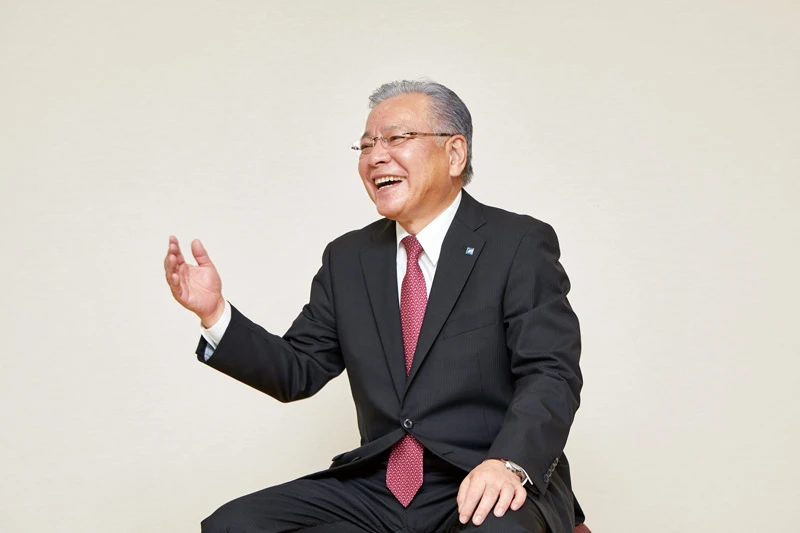
Yoshida
I got to meet you for the first time at a gathering of Meiji University alumni business executives. I think it was four or five years ago. We have known each other personally since then but in terms of our companies, KYB has used a lot of our measuring equipment from back when it was Kayaba Industry, for which I am very thankful.
Ôno
I tried to look up when we first started using ACCRETECH measuring equipment, and found that it was so long ago that I couldn’t find specific information (laughs). The oldest remaining record shows that in 1986 we introduced a 3D coordinate measuring machine with the model number XYZAX GJ 800D to our Sagamihara Factory.
In our Sagamihara Factory alone, we have four 3D coordinate measuring machines for aircrafts, four surface texture and contour measuring instruments, one roundness and cylindrical profile measuring instrument, and two air micrometers. A different line in the same factory has three 3D coordinate measuring machines and two surface texture and contour measuring instruments. And that’s just in the Sagamihara Factory.
Yoshida
Thank you so much for doing business with us. I’m very grateful that KYB uses our products not only in domestic factories but also in factories all over the world such as Thailand and Mexico. We will continue to do our best to support KYB in producing quality products.
The “Our Precision, Your Advantage” Brand Statement
Yoshida
Demand for quality gets more stringent every year, but what aspects of quality does KYB value in particular?
Ôno
We uphold the idea of “Our Precision, Your Advantage” as our brand statement. We believe that as KYB continues forward, the act of delivering reliable quality to our end users, customers, and clients not only represents an “advantage” to our stakeholders, but also to each employee, who can feel joy in knowing they are changing the world for the better with the quality they help create.
True to these words, we prioritizes quality above all else in our quality management. About three years ago, we had a concerning incident with some of our oil dampers, and we have since made reforms with uncompromising quality in mind.
Yoshida
KYB has a fair number of factories overseas, and I imagine the COVID-19 pandemic has made it particularly difficult in recent years to visit these factories in person to check in on them. Given the situation, does each individual region engage in quality management and report to the company separately?
Ôno
The head office lays out the basic guidelines, then each regional office relays them to local subsidiaries. We employ various other strategies as well, such as making it a rule to have each region make reports on quality to the appropriate business entities. In addition, we also have a system for the head office to receive information on how factories in each region are doing on a regular basis.
Production-Related Approaches
Yoshida
KYB has quite a number of offices all over the world and does business in a wide range of fields. I imagine standardizing the parts used across such a large-scale corporation must be a challenge, but are there any particular approaches you take?
Ôno
Yes, standardizing the parts used in production is the biggest challenge we face. The majority of our overseas office are what we added through M&A, so each place uses different specifications, parts, and production methods. But that throws a wrench in business continuity planning and we can’t for example consolidate orders to cut down on unit costs. Changing this is extremely challenging and will take multiple years. But if we don’t do something we’ll cease to be competitive so we’re currently trying to figure out how to go about it. In addition to standardizing parts use, we want to set up production systems that use the same equipment and same procedures so that the resulting products are the same no matter who is manufacturing them. Compared to the past, overseas labor costs everywhere are increasing, and Japan’s population is aging fast. We always relied on manpower, but we will have to cut down on labor from here on out. Ultimately, we want to make our factories as unmanned as possible. That inevitably means that each factory will have more equipment in it. From there, success will be all about doing advance research on IoT and equipment warranties and such to best maximize productivity. If each region is using separate equipment and procedures that will make overall management that much more difficult and time-consuming, which will be a huge problem down the line.
Yoshida
So in addition to standardizing multiple aspects you will also be focusing on automation. We are also seeing an increase in requests for automating measuring instruments. The conventional method was to pull products off of the production line to be checked using measuring instruments in a separate inspection room. But in recent years, more customers are looking to do in-line measurements without stopping production flow in their quality control. Each production line is in a different environment, so in order for our instruments to be used in-line we must improve resistance to environmental conditions. Precision measuring instruments are extremely sensitive to temperature changes and also require measures for controlling dust and oil mist. We are dedicated to developing solutions that enable high-accuracy measurements in spite of problematic conditions. Now is also the time to be making environmentally conscious reforms in terms of SDGs compliance, ESG, and issues such as carbon neutrality. What kind of things are you doing at KYB?
Ôno
This past July, we established a new ESG Promotion Office that reports directly to the president to actively strengthen whole company endeavors in this area. We have already introduced solar power generators and a system of reusing scrap materials, in addition to promoting employee health management, which has certified KYB as an outstanding Health and Productivity Management Organization for two consecutive years. In terms of products, we comply with environmental regulations in each country and work to increase efficiency such as with low friction technology and electric-driven pumps. We also engage in LCA endeavors and making smaller and lighter products.
Visions for the Future
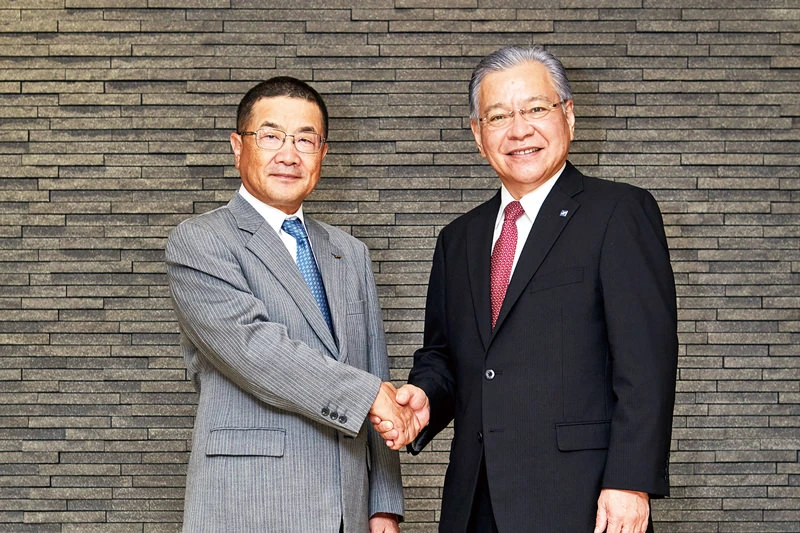
Ôno
The construction machinery and automotive industry, two of KYB’s major markets, are both in the midst of a once-in-a-century period of transition as seen with CASE and MaaS. As I mentioned briefly before, the construction machinery industry is trending towards automation, unmanned use, and electrification. There is increased demand for electronically controlled and load sensing systems that don’t rely on operator experience, and we using our expertise in load sensing systems for mini shovel machines to develop products with even better performance. We are also working to expand sales by marketing systemization with our lineup of hydraulic pumps, cylinders, and motors. Meanwhile, to keep up with the acceleration of vehicle electrification in the automotive industry, we are further developing our core technologies to add value to existing products and expand existing business areas such as the Swing Valve and our Prosmooth shock absorbers with improved sliding properties. In addition, because electric motors are quieter compared to conventional engines, shock absorbers must be designed to be quieter as well. In order to meet such demands, we are applying our knowledge of hydraulic technologies to expand our product offerings. We are also pushing the development of products that are compatible with next-generation platforms. We think of emerging manufacturers and mega-systems suppliers as potential customers in addition to our existing automotive manufacturer clients, so our sales, technology, and business divisions will work as a whole to uncover latent needs via customer presentations and develop products accordingly.
Yoshida
I suppose with the acceleration of monozukuri innovation in recent years, the environment surrounding KYB has also been changing quite a bit. As KYB pioneers the future towards a new era, we will also strive to propose new possibilities for monozukuri though our measuring instruments.
KYB Corporation.
Founded as Kayaba Manufacturing Co., Ltd. in 1935, the company is a comprehensive hydraulic equipment manufacturer that provides products that make use of vibration and power control technologies that rely on hydraulic components. It is active in a wide range of fields including hydraulic components for construction machinery, shock absorbers for two- and four-wheeled vehicles, and suspension systems. It continues to provide products of uncompromising quality in Japan and all over the world, including Europe, Asia, and America.

